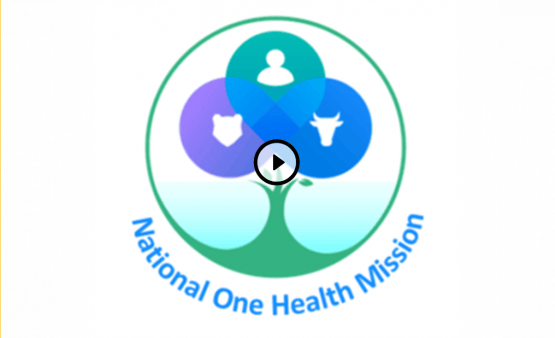
- A+
- A
- A-
What is One Health
One Health is a collaborative, multidisciplinary approach that unites human, animal, and environmental health sectors. It recognizes the interconnectedness of these domains, aiming to optimize health outcomes and address challenges across the sectors.
One Health has major implications for India. India with its diverse wildlife, one of the largest livestock populations and high density of human population, carries heightened risks for inter-compartmental spread of diseases. One health approach relies on shared and effective governance, communication, collaboration and coordination. Having the One Health approach in place makes it easier for people to better understand the co-benefits, risks, trade-offs and opportunities to advance equitable and holistic solutions.
The Covid pandemic, outbreaks of Lumpy Skin Disease in cattle and the constant threat of Avian Influenza demonstrate the need to address diseases across all sectors. Livestock, wildlife and plant sectors impact productivity, health and conservation aspects. This also opens opportunities for leveraging the complementarity and strengths that are inherent in each sector and devising integrated, robust and agile response systems.
- IDEA ONE: National One-Health Hackathon
- Third Scientific Steering Committee Meeting held under the chairpersonship of Prof. Ajay Kumar Sood
- The Report for the State & Union Territory Engagement Workshop under the National One Health Mission released during the Third Scientific Steering Committee Meeting
- The Office of the Principal Scientific Advisor to the Government of India organized the first State/UTs engagement workshop under the National One Health Mission
- Launch of the Youth Engagement Program
- Collaborative Bird sanctuary surveillance project
- Central Zoo Authority Organizes a Workshop on Development of the National Wildlife Health Policy
- Meeting with Government stakeholders and multilateral organizations on potential collaborations in One Health under the chairmanship of Prof. Ajay Kumar Sood
- First Scientific Steering Committee was held under the chairmanship of Prof. Ajay Kumar Sood
- “VISHANU YUDDH ABHYAS”: A Mock Drill on Pandemic Preparedness conducted under National One Health Mission
- First Executive Committee Meeting of the National One Health Mission

National One Health Mission
There are many One Health efforts underway in various Ministries of the Government of India, in private organizations in addition to a range of activities globally. This presents a prospect to review the areas of focus underlying each effort, identify opportunities for collaboration and work towards filling any remaining gaps. Considering this, The Prime Minister's Science, Technology, and Innovation Advisory Council (PM-STIAC) in its 21st meeting, approved to set up a National One Health Mission with a cross-ministerial effort which will serve to coordinate, support, and integrate all the existing One Health activities in the country and fill gaps where it is appropriate. The Indian Council of Medical Research (ICMR) is the implementing agency for One Health Mission.
The mission received further impetus in February 2024, with the approval of the Director position for National Institute of One Health, Nagpur by the Union Cabinet chaired by Prime Minister Narendra Modi. This institute will be the anchor for the One Health mission and co-ordinate the activities of the mission in the country.
An integrated framework developed collaboratively by over 13 government ministries/ departments guides the mission. This framework facilitates coordination and synergy across sectors for priority activities.
The governance of the National One Health Mission is two tiered:
• Executive Committee: The Executive committee chaired by Hon’ble Minister, MoHFW with PSA as vice chair and Member Health, NITI Aayog is a permanent invitee. Secretaries of various stakeholder departments and two states (on rolling basis) are members. The committee provides overall policy guidance for the progress of the mission and its associated activities.
• Scientific Steering Committee: The committee is chaired by the PSA and has Secretaries/DGs of all stakeholder departments and two states (on rolling basis) as members. It provides overall scientific direction, oversight and guidance to the National One Health Mission.
Goals of the One Health Mission
The Mission aims to coordinate across achieving overall pandemic preparedness and integrated disease control against priority diseases of human, animal and environmental sectors with early warning systems built on integrated surveillance system and response readiness for endemic as well as emerging epidemic or pandemic threat.
The mission will also address critical pillars of preparedness in the form of targeted R&D to develop critical tools such as vaccines, diagnostics and therapeutics, readiness in terms of clinical care, streamline data and information linkages and access across sectors as well as close community participation to keep our readiness to respond.
The following robust efforts are being undertaken to achieve the various goals under the mission:
Preparedness is important not just the human pandemics but also the animal diseases of pandemic potential which have high economic costs to the farmers and can have important implications for wildlife conservation through spread into protected species. Human and animal pandemic preparedness is a key pillar of the One Health Mission, which relies on effective surveillance stategies, developing early warning systems, boostiong research, innovation and manufacturing, infrastructure, community engagement and data integration across sectors.
One of the key initiatives, under this goal is creation of a network of BSL 3/4 labs, within the framework of the One Health Mission. This network will play a critical role in preventing, detecting, and responding promptly and effectively to disease outbreaks across human, livestock and wildlife sectors. Currently there are 22 labs in this Network. This network which is geographically distributed and accessible to all stakeholders (humans, livestock and wildlife) for analysis of disease outbreak samples will enhance India’s preparedness for emergencies.
Read More...
All the aspects of pandemic preparedness will be embedded in the routine prevention programs to ensure sustainability and continued improvement of both aspects.





